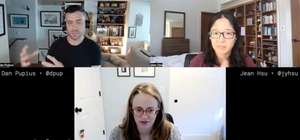In this episode of Lead Time Chats, Jean Hsu, VP of Engineering at Range, chats with Joaquín Roca, Founder of Minerva, about feedback and performance conversations in a remote work environment.
Joaquín and Jean discuss:
- Why it’s important to give feedback that’s frequent, timely, continuous, and focused on impact.
- The general rule of thumb to give 5 pieces of positive feedback for each piece of constructive feedback
- Cadences and structures to support regular feedback
- Continuous feedback ensures that nothing in a performance review is a surprise
- How to give feedback on work performance when teammates are dealing with personal struggles
Takeaways from Joaquín
Set up regular cadences to provide feedback
"Part of what you lose from being remote potentially is opportunities to give feedback, right? If you're waiting for the next zoom call to give someone feedback or it may or may not be the right time or situation, you don't have those interstitial moments between meetings where you're running into someone or call them into your office quickly, whatever it may be. I think setting up regular cadences and processes to make sure that you're giving frequent feedback, both developmental feedback, constructive critique, but even more importantly, praise and appreciation. And so I think it's really important. It's been important for us to standardize that and make sure that we're doing it frequently.”
Find the right balance between positive and constructive feedback
“I always say, if you think about it, you've hired these people because they're talented. They're good at what they do. You should be telling them, "Hey, this was a really good thing that you did" often so that they do more of that. If all you ever do is tell them what they're not doing well, what they're not good at, they're probably gonna start to do more of what they're not good at. They're focusing on it, cuz you focused on it. And now all the great things that they typically do that you hired them for that they're really good at, they take for granted, they don't do anymore, and so now you've created someone who's just performing poorly cause of the focus on what they do poorly. But if you say a general rule of thumb, five times I wanna give someone kudos for every one time I give them some bit of developmental feedback so that they know if you continue kicking ass in this way, we're gonna be great.”
Use separate meetings for separate topics
“If you make it a huge process, then it's the problem. We'll do comp on your anniversaries and it'll have to do with your reviews, but that's a separate meeting. We're gonna be doing your career development at a separate time, that's a separate meeting. This is just about how are you doing in your job? Career development is just, how are we supporting you and growing your career? A comp plan is about compensation and career planning and laddering. Separating these distinct things out, not trying to put them all together into one meeting that happens once a year and it's everything then it's not quite as onerous.”
Enjoy Lead Time Chats?
Subscribe to the Lead Time Chats podcast on Apple, Spotify, or wherever you listen to podcasts, so you don’t miss any episodes.
Please leave us a rating or review on iTunes! It'll help these chats get in front of more engineers and leaders like yourself.
About Lead Time Chats
Listen in on unscripted conversations between Jean Hsu, VP of Engineering at Range and other leaders in tech to help you make remote teamwork a little bit less challenging.
Lead Time Chats is brought to you by Range. Range helps remote teams work better together — with asynchronous check-ins, integrated team-building, fewer and more effective meetings, and easy goal-tracking. When you run your team with Range, you’ll always know what’s going on — without having to be in back-to-back meetings.
Checking-in with Range creates more focus time for heads-down work, all while feeling a deeper sense of connection and belonging with your team.
To learn more about Range, you can check it out here.
Season 4 Episodes
» Episode 1: Najeeb Khan on Fostering Belonging on Remote Teams
» Episode 2: Hong Quan on Hiring for Remote Teams
» Episode 3: Jori Lallo on Working Effectively Across Timezones
» Episode 4: Suzan Bond on Navigating Conflict on Remote Teams
» Episode 5: Andy Detskas on Building an Inclusive Team
» Episode 6: Steph Mann on reinforcing values on remote teams
» Episode 7: Fred Plais on Globally Distributed Teams
» Episode 8: Brooks Scott on Fostering Diversity and Inclusion on Remote Teams
Season 3 Episodes
» Episode 1: Jen Kim on how startups can hire better
» Episode 2: Kate Heddleston on managing burnout on your team
» Episode 3: Jessie Duan on the Chief of Staff to CTO role
» Episode 4: Dan Na on pushing through friction
» Episode 5: Pat Kua on flavors of tech leadership
» Episode 6: Anna Sulkina on Endurance Sports and Software Engineering
Season 2 Episodes
» Episode 1: Camille Fournier on making boring plans
» Episode 2: Tess Rinearson on early career engineering managers
» Episode 3: Kim Scott on building for systemic justice
» Episode 4: Sumeet Arora on moving on from a big company
» Episode 5: Rachael Stedman on IC manager work
» Episode 6: Chris Bee on Behaviors of Effective Eng Leaders
» Episode 7: Lynne Tye on the Engineering Hiring Landscape
» Episode 8: Beau Lebens on Distributed Team Meetups
» Episode 9: Indrajit Khare on Getting Acquired by Google
» Episode 10: Jack Danger on Technical Debt
» Episode 11: Sarah Milstein on Successful Remote and Hybrid Teams
Season 1 Episodes
» Episode 1: Will Larson on the path of the senior engineer
» Episode 2: Duretti Hirpa on mentoring junior and mid-level engineers
» Episode 3: Cate Huston on working with an external coach
» Episode 4: Juan Pablo Buriticá on common eng manager mistakes
» Episode 5: Gergely Orosz on the decision to go into management
» Episode 6: Lara Hogan on leading effectively in a pandemic
» Episode 7: Kaya Thomas on common early career engineer challenges
» Episode 8: Uma Chingunde on starting a VPE role in a pandemic
» Episode 9: Katie Wilde on supporting your team's mental health
» Episode 10: Akhil Gupta on navigating uncertainty in new roles
» Episode 11: Harper Reed on giving everyone a voice in team meetings
» Episode 12: Marc Hedlund on sponsorship








